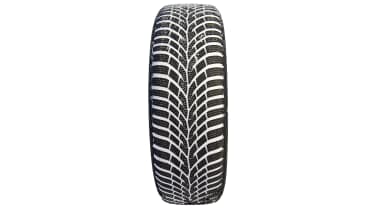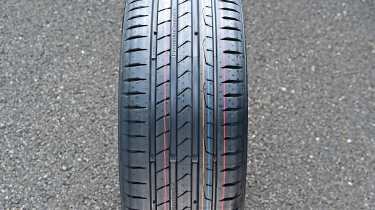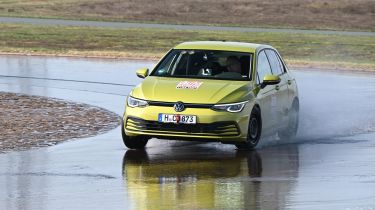Other tyre choices
An all-season tyre is just that - for all weather conditions. But in some climates, a winter or summer tyre is better
Winter: Continental WinterContact TS 870

- Score: 98.2%
- Price: £130
Winter tyres are designed specifically for the coldest season of the year, with the expectation that they with be replaced by summer versions for the warmest months, so their capabilities are more concentrated than an all-season’s. As we would expect, the winter tyre has superior performance in the snow, although the latest all-season designs get remarkably close; the best winter is only marginally better than the best all-season.
In cold, wet conditions, the winter tyre is competitive in most of the tests, especially aquaplaning, thanks to the wide grooves designed to capture snow. However, in the wet braking test, the winter falls short of the best all-season. It’s the same in dry braking, and these gaps would only grow in warm conditions because an all-season tyre is designed for a broad range of temperatures, but a winter compound is optimised for cold days.
Blackcircles.com says:
“Customers praise the grip and handling on snow and ice”
| Continental WinterContact TS 870 | Score |
| Snow braking | 101% |
| Snow traction | 105% |
| Snow handling | 101% |
| Straight aquaplaning | 102.2% |
| Curved aquaplaning | 108.6% |
| Wet braking | 90.4% |
| Wet handling | 99.0% |
| Wet circle | 99.9% |
| Dry braking | 86.6% |
| Dry handling | 98.6% |
| Cabin noise | 100% |
| Rolling resistance | 93.4% |
Buy the Continental WinterContact TS 870 from Blackcircles.com
Summer: Continental PremiumContact 7

- Score: 98.0%
- Price: £102
There are many reasons why a summer tyre is unsuitable for snow, the main one being that its compound is not designed to work at temperatures lower than 7°C. Below this, it becomes hard and inflexible. The tread of winter and all season tyres is designed to hold snow (much grip comes from snow in the tread gripping snow on the ground, like a snowball). In contrast, the tread pattern of a summer tyre is designed for water clearance and generating lateral grip and traction on warm asphalt.
The result is that a summer tyre finds limited grip on snow and much-reduced grip in cool, wet conditions. The results for snow show this – it was a struggle to get going on the summer tyre and just as hard to turn and stop. But, with low temperatures for the wet tests, the summer tyre performed well. When the mercury drops, winter and all-season tyres come into their own, coping with all conditions.
Blackcircles.com says:
“Reviews note that cars handle better with these tyres than previous ones”
| Continental PremiumContact 7 | Score |
| Snow braking | 38.8% |
| Snow traction | 33.4% |
| Snow handling | 69.2% |
| Straight aquaplaning | 96.5% |
| Curved aquaplaning | 101.8% |
| Wet braking | 104% |
| Wet handling | 101.8% |
| Wet circle | 104% |
| Dry braking | 106.1% |
| Dry handling | 101.3% |
| Cabin noise | 99.1% |
| Rolling resistance | 91.1% |








